Male, adult, femboy, disabled and all that fun stuff, I just be yappin
Don't wanna be here? Send us removal request.
Text
when people talk about intentional plurality i beg them to look into IFS. I saw a post recently about someone praising plurality as an intentional coping mechanism rather than a trauma response through dissociation, and how it can be helpful to imagine different “alters” for different situations to make life a little easier.
yes, this is a coping strategy— internal family systems. this is NOT plurality.
i will always come back to this: if you have to pretend to be someone else, that’s not plurality. recognized plurality ONLY stems from intense, repeated trauma and some form of dissociation/derealization that happens unconsciously as a result.
DID ≠ a coping mechanism
DID = a trauma response!!!
523 notes
·
View notes
Photo
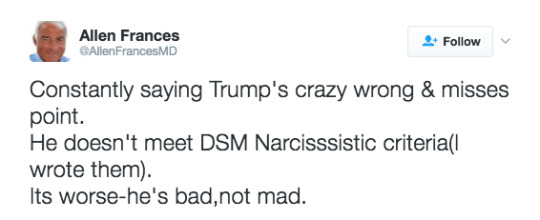
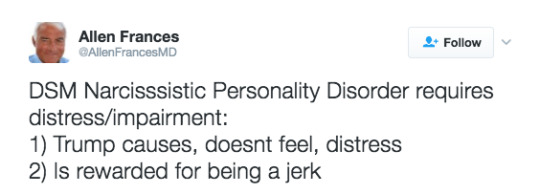
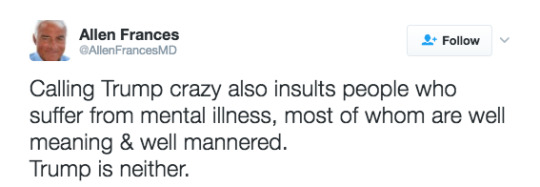


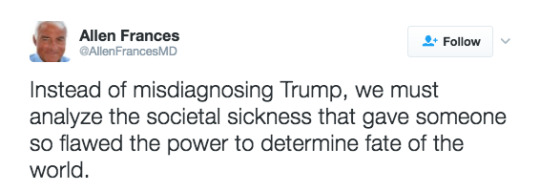
The psychiatrist who wrote the criteria for narcissism just made an extremely important point about what’s wrong with diagnosing Trump with mental disorders
Dr. Allen Frances says in speculating about Trump’s mental health, we are doing a disservice to those who do suffer from mental illness. In a series of tweets, he explained why he doesn’t think Trump is a narcissist — and how harmful it can be for us to keep assuming that he is.
138K notes
·
View notes
Text
one time one of the previous hosts was dating someone, nothing super serious yet but they told them about having DID so there'd be no surprises, it was really hard to even bring up but they were surprisingly super chill about it.
And then after idk a few weeks or months after they both seemed to want a relationship but just hadn't made it "official" the host was like "look I want to know if you're actually okay with the way I am and understand what it entails, how a relationship might look, that sometimes I'm not 'me' and I won't always remember things."
And they take a minute to respond, do that typing off and on thing. "Yeah the more I think about it, it's just icky. I know it's not your fault that you're like that and we can still be friends if you want".
"Icky". Mf you're icky lol
mfs be like "I can handle your disorders" until your disorders disorder disorderly
#did#actually did#actually dissociative#did stuff#ableism#disability#first red flag was probably that one date where they were like#“yeah i've been going on dates with a few ppl to sorta see who i want to be with. if it helps you're winning me over more than them”#like what???
14K notes
·
View notes
Text
If being plural has "nothing to do with dissociative disorders" then stop using terms and entering spaces that are strictly for those with dissociative disorders.
Stop calling yourselves systems, stop calling them alters, stop barging into udd/did/osdd spaces.
It's not that fucking hard.
- 🖥 (he/him)
332 notes
·
View notes
Text
just a healthy reminder do not try and process your trauma by yourself or without a medical professional. It is very dangerous to do so.
148 notes
·
View notes
Text
One thing I don't hear many people talk about with DID is that if you discover it in your teens or 20's you're almost certainly gonna lose a lot of your teen/young adult years to it. Most (but not all) people I've met with it (those that I am confident truly experience it) are severely physically disabled. And the more awareness you have of it, the worse it gets. If you're 16 with DID and know all like 40 of your alters and have fluid internal communication, that is typically quite unsafe.
Personally I discovered it earlier than most, right when I became an adult and moved out. In a majority of cases, discovery of the disorder is caused by an event like this- be it a minor car accident, the death of an abuser, or moving out of your abusive environment.
It cost me so much. My physical and mental health, friendships, relationships, opportunities, things that one would need to stay sane and function as an adult.
When those walls between you and everything that tried to kill you for longer than you can remember begin breaking down, how do you even learn to be human? And when you realize it'd already taken so much from you before you knew it existed, where do you even go from there?
#did system#actually did#cdd#cdd system#did osdd#actually dissociative#cdd community#did#osdd#system stuff
45 notes
·
View notes
Text
I'm not about to argue about whatever-genic origins or their validity, I'm too exhausted, but this post is not about them. It is exclusively about CDDs and how they work fundamentally, especially in the case of DID.
Relating to a character is still not the cause of the split which you sort of seem to agree with. Depends on if by "relating" you mean "oh what a relatable guy he's just like me and I enjoy him!" or something more along the lines of like "oh, they went through what I went through and came out stronger so I associate this with my situation and it would help me survive" at a time when a split is more likely because the stress/trauma is occurring or resurfacing. But at the time of splitting it makes sense that someone with DID wouldn't always accurately identify why they split and may think it's simply because they related to or liked the character. So people become fearful of watching or enjoying things.
Being stressed or traumatized wouldn't reasonably increase the chance that one will split introjects from whatever they're into at the time. Again, introject or not the brain creates what it needs in a given situation.
I'm well aware of polyfragmentation, but it is an atypical presentation of DID. Yes people do go undiagnosed and therefore not documented in the medical system so I can't account for everyone that's ever had DID. But from all available research on documented cases, the consensus over the last century or so would seem to be that the presence of polyfragmentation is relatively uncommon and it requires an extremely severe level of dissociation and dissociative barriers. If polyfragmentation was the norm, it wouldn't make sense that despite it being more severe in its origins and presentation, it's far less observed or understood by those who specialize in treating CDDs and complex trauma. If the majority or even half were these very severe cases, logically that's what would be most commonly documented.
When research is conducted on DID patients, we can observe patterns and understand the likely frequency of different phenomena and presentations. There are many statistics and conclusions that can be drawn about what DID tends to look like based on what is observed clinically, which helps in identifying, understanding, and treating it.
Uncommon doesn't mean impossible obviously, but evidence supports that the vast majority of cases are not polyfragmented. Most recorded cases of polyfragmented DID still don't seem to result in constant introjects based on what one's interests are at the time but atypical doesn't mean it can't happen. There just would have to be a reason for it, the brain splits what it needs in that situation, not just what you are invested in or enjoy. That's all I'm saying- it's nothing to do with your brain going "oh I'm stressed and I would love to have all of these guys around to cope with it", compartmentalization is more complex than that.
Still, I'm glad the reminder was helpful, I don't think all of our opinions are all that different.
Alters exist based on the current needs of the individual with a CDD, not what media they're into or hyperfixated on. That's kinda why I don't get the whole "yeah I wanted to watch that new show but I'll split every character from it so I better not hehe!!" because that's just factually not how that works. Maybe you don't know why an alter split. That doesn't mean it was because you watched the show, maybe even while you had a mildly stressful test coming up, and your brain was like "yeah I need all of them because I like them".
That's not to shit on anyone with a lot of fictional introjects or who split more easily than most, you can't help that, but I've yet to find anything to support the idea that a fixation or interest can be the sole cause of a split. A character that influences an introject will have some quality(s) that are necessary for survival, be it because they have a personality trait(s) that would protect you or somehow in some capacity their likeness helps you compartmentalize an adverse experience.
So no, you don't have to worry that you'll split every character if you watch a new show and enjoy it. Even if you undergo stress or trauma, those introjects would also have to happen to be exactly what your brain needs to survive your current circumstances. And the odds of every character in a show being what your brain needs to compartmentalize adverse experiences are extremely slim.
If you have 5 splits over the month that you're watching a show and they all happen to be introjected from characters from it, I mean that's atypical but say it happened, 5 splits would have almost definitely happened whether or not you watched the show. There are always exceptions, like if the show triggered some old trauma due to a very similar experience, but generally speaking that would be unlikely.
I'm not even trying to police people's experiences but I think some people genuinely misunderstand how alters work on a fundamental level and fear basic experiences like watching a movie because they don't want to split. Like maybe they split an introject based on a character before and think it must be because they liked that movie and were a bit stressed at the time of watching it when that isn't the actual reason. Idk
#cdd system#did osdd#actually dissociative#actually did#did system#cdd#cdd community#did#osdd#system stuff
47 notes
·
View notes
Text
Tweaking out because I can’t believe some people look at this disorder and think it’s cool and quirky and they want to have it too
They need to grow up and not get an emotional boo-boo every time they can’t be part of a community formed out of shared struggles, struggles they literally don’t have
You don’t “make” your system. You don’t “choose” to be plural. Use different words for it. Make your own community. Don’t try to loop it in with actual dissociative disorders because it’s just harmful.
The aggression comes from the fact that this is literally hurting people, both those who are systems and those who aren’t. Please be more educated and respect a community you aren’t part of.
#did system#did community#anti endo#dissociative identity disorder#actually did#actually dissociative#did#did osdd
332 notes
·
View notes
Text
Dear everyone who has claimed that endogenics and pro-endogenics do not claim to be disordered.
So why use disorder specific tags?



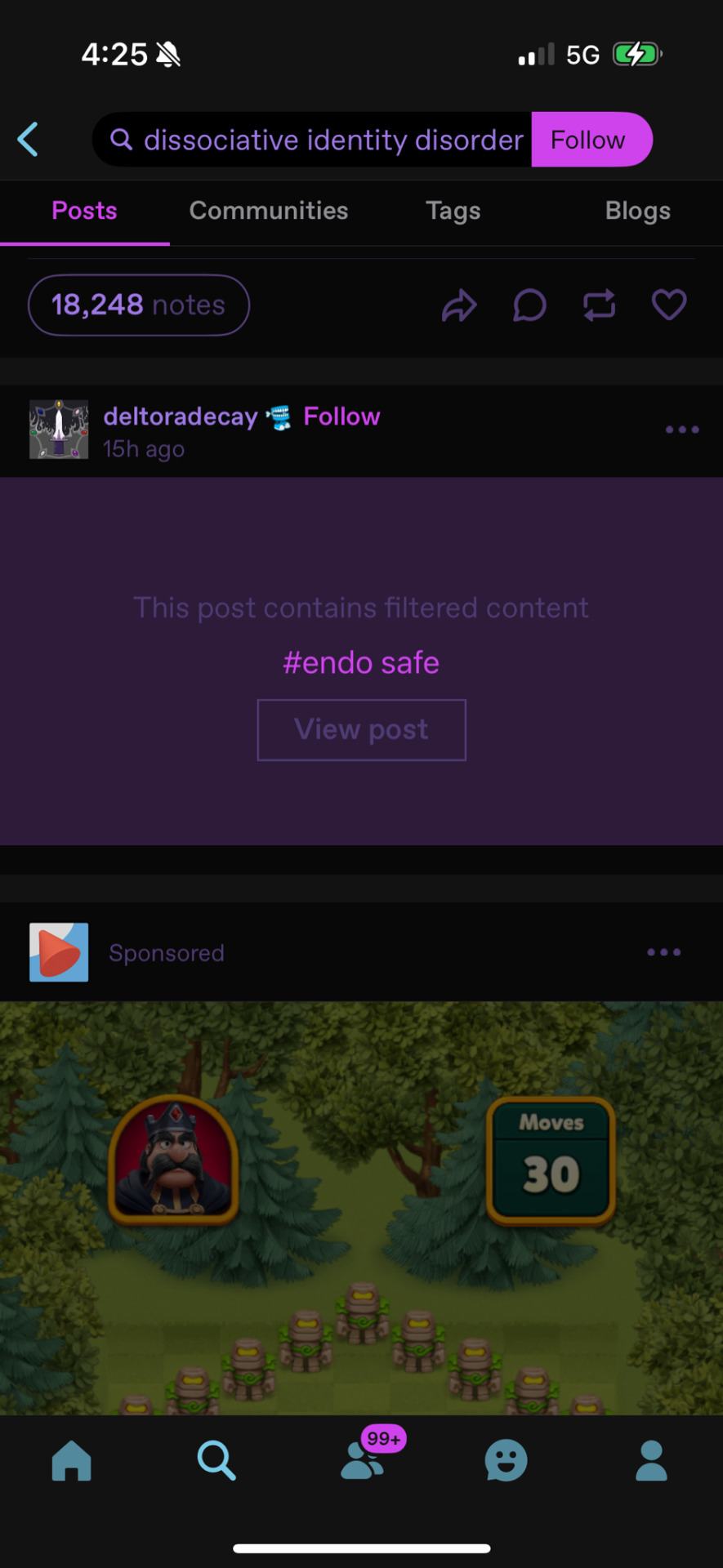
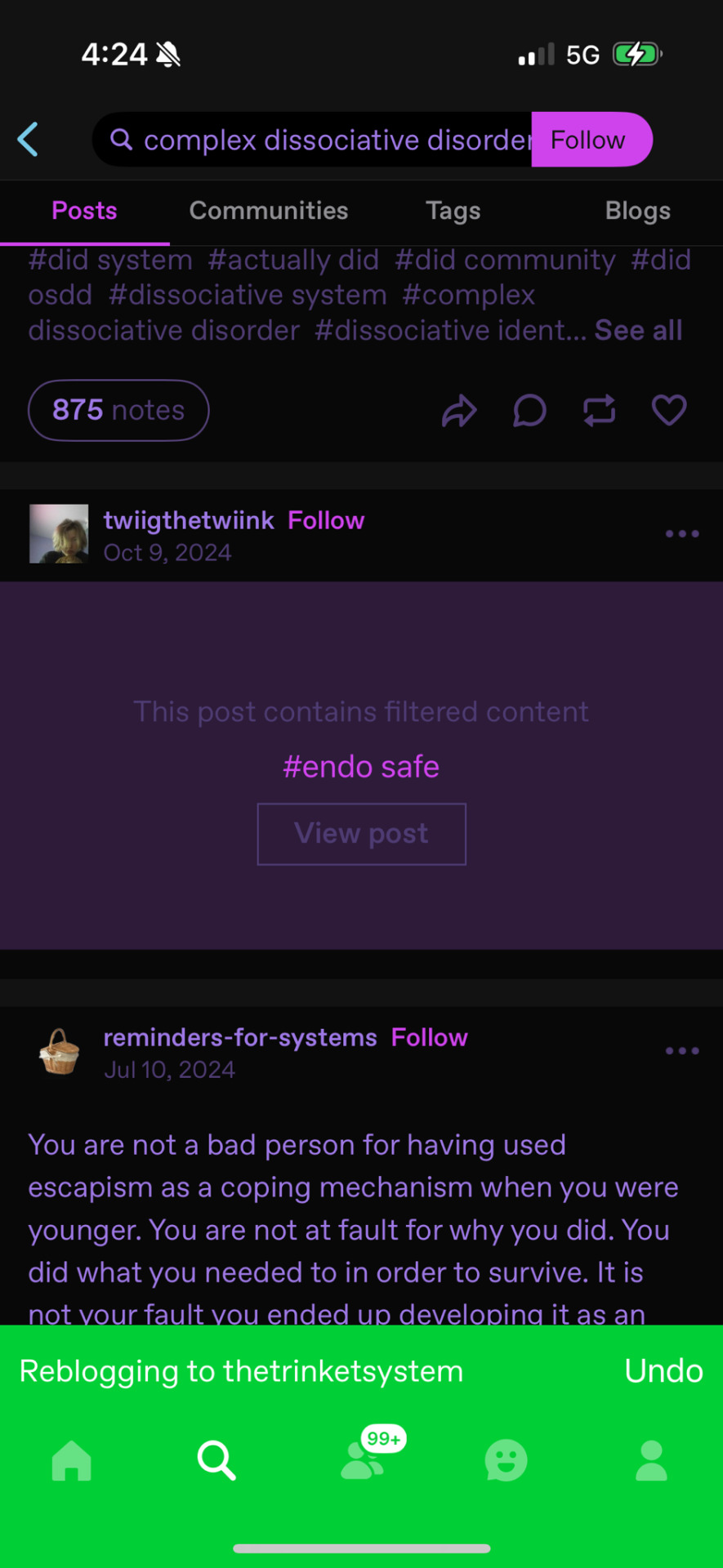
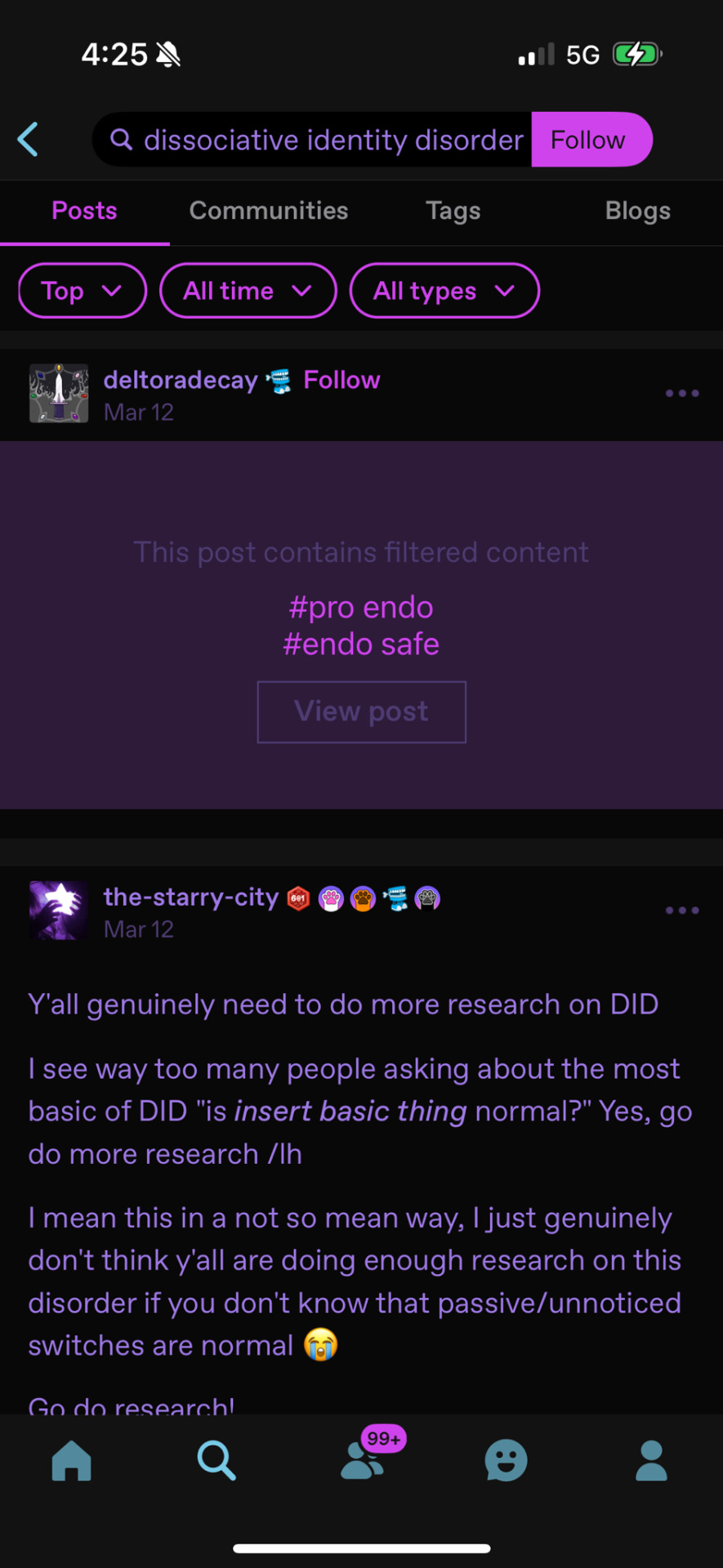
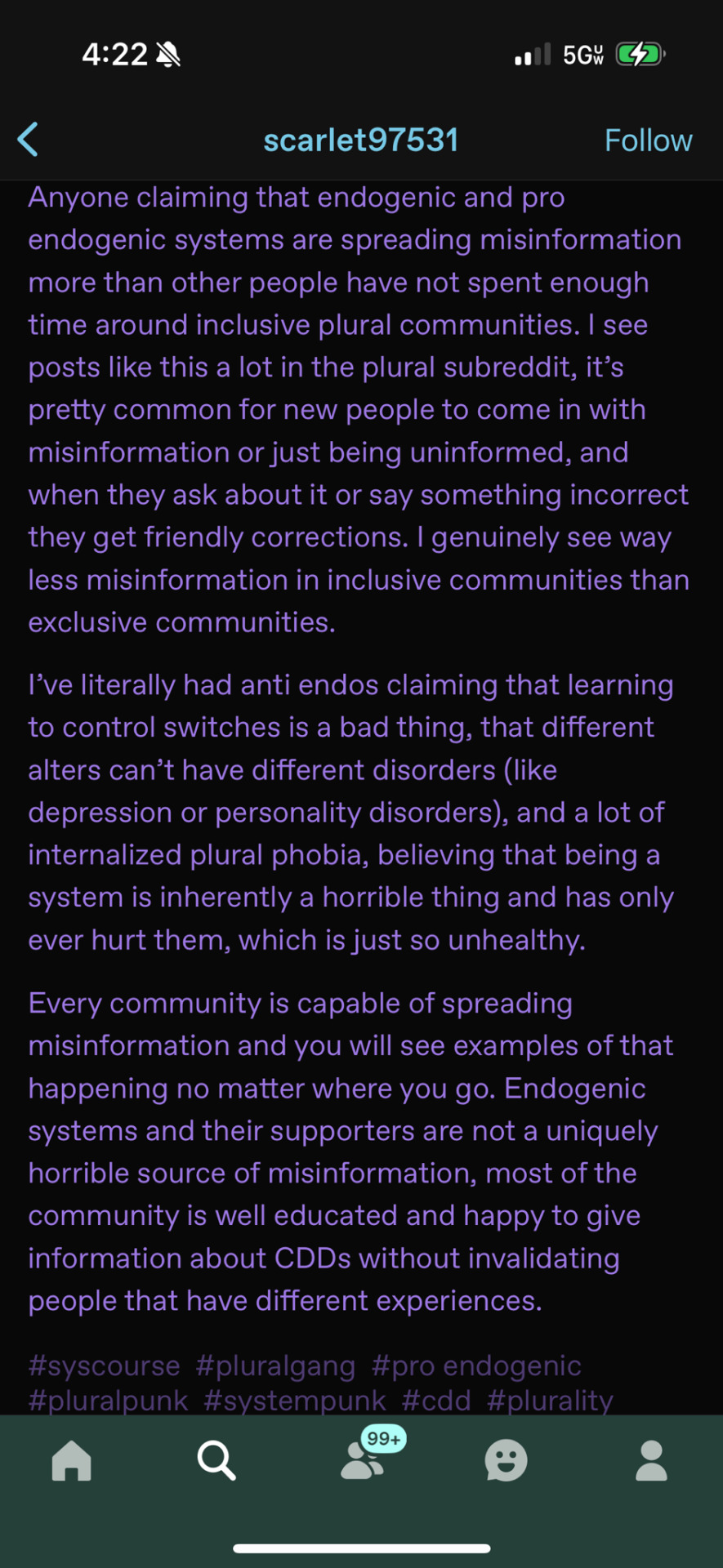

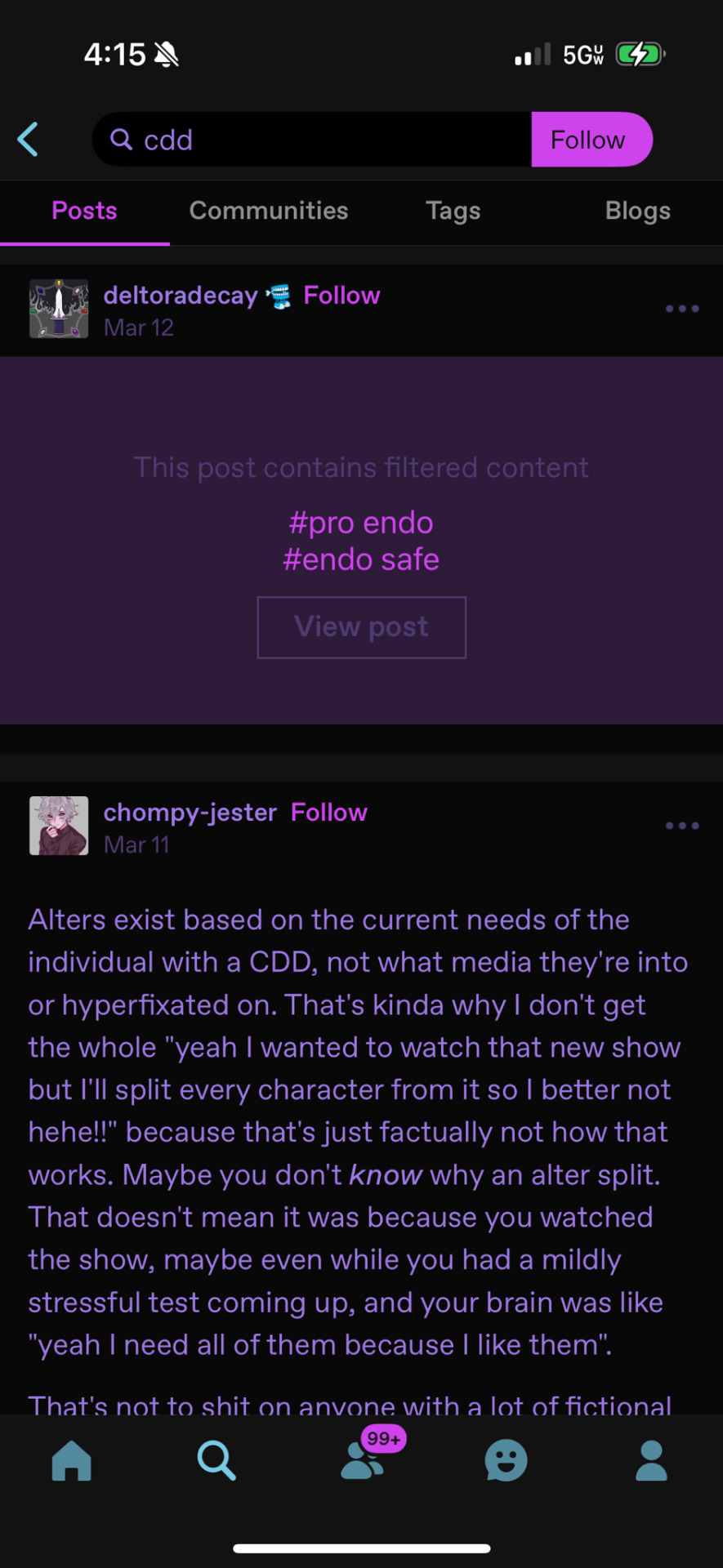

I have more but I reached the picture limit ♥️
If you don’t claim to be disordered why use disordered tags?
CDD
Complex disassociation DISORDER
Did
Dissociative identity DISORDER
DISORDER
DISORDER
DISORDER
DISORDER
KEEP DISORDERED SPACES OUT OF YOUR TAGS AND STAY OUT OF DISORDERED SPACES
#oh look its me#anti endo#did system#cdd system#did community#complex dissociative disorder#CDD#dissociative identity disorder#did
45 notes
·
View notes
Text
I can't tell anyone what to do, but I highly advise against trying to discover more parts without the help of a licensed and qualified professional. Even under medical supervision this could be dangerous as is the nature of trauma work, but I see people encourage doing this alone and even try to give tutorials on how to find more alters. It's akin to telling someone to dig for history of their forgotten childhood trauma or otherwise try to remember something terrible that they've forgotten because their brain is protecting them from it.
I had a therapist who guided me on how to discover more alters and improve communication but when it didn't go well she didn't know what to do and severely mishandled the situation, and it nearly cost me my life. It didn't help that much of the community has made it out to be without risk. Learning about and having constant communication with others was supposed to be helpful, I mean if you can communicate with the others you logically would function better right? But when you break down those barriers you have to remember what an alter is on a fundamental level and be aware that exposure to them can mean exposure to what they're protecting you from. They won't always be happy to cooperate and may have their own ideas of how things should be or be trapped in a mindset that causes them to lash out.
For me it meant being retraumatized, hardly being able to function, alters with intense trauma acting out so severely that I was permanently physically disabled by them to the point of needing a mobility aid. I'm not exaggerating or joking, encouraging people to discover more alters and treating it like a fun little thing to do over the weekend to meet new silly little guys without any acknowledgement of the potential negative outcomes is irresponsible and can kill someone. Dissociative barriers exist for a reason and they're important in protecting you. Getting rid of them means you must get rid of the need for them.
Some 16 year old who is stuck in their abusive environment and is struggling with constant stressors and thinks that learning more about the others will put them back on track, who doesn't have the resources to recover or even cope with their disorder, they could genuinely die because someone on TikTok made a guide on how to improve communication and awareness of alters and encouraged it for anyone who has or even suspects the disorder. I have seen content like this and it genuinely terrifies me because I'm well aware of how easy it is for it to go wrong. I know people do it with good intentions and that sometimes a level of improvement in communication can be constructive or helpful, the end result won't always look like my situation. I had prior improvements and discoveries that didn't turn out horribly. But I see no disclaimers or words of caution, just complete encouragement like it is not a potentially massive safety risk especially without professional supervision.
For fuck's sake please be responsible with the content you make and the information you share, and make sure that your psychologist knows what they're doing.
#actually did#cdd#cdd system#did system#cdd community#did osdd#actually dissociative#did#osdd#system#system community#system stuff
26 notes
·
View notes
Text
It's ugly, trauma is ugly, DID is ugly. No one is supposed to be like this.
DID exists to protect you so of course you can have alters that make you happy, you can have silly moments, but I feel like every day I see it treated more and more like "silly little characters in your head disorder" by a lot of people and with less seriousness or dignity than any other disorder I've seen. The internet doesn't talk about anything the way they talk about CDDs. I'm not saying people must only speak on DID in an educational or very negative context but imagine if people talked about PTSD or bipolar disorder like this, entire accounts dedicated to talking about it and yet depicting it as an almost exclusively positive experience.
Alternate identity states are a product of severe trauma/disorganized attachment and it shows in literally every case I've researched or seen irl. I hate saying this because it pisses people off but "internet DID" bears hardly any resemblance to DID in clinical settings. As in, the way that is deemed "acceptable" to post about it and the types of content that is seen as most favorable. I don't think it's in the best interest of pwDID to see it treated as a novelty more than a disorder.
i hate having DID. i hate how i cant talk about hating my DID because everyone, real-life and online, has made the subject of self-hatred with DID taboo.
you're only allowed to talk about your alters doing silly shit now. if you talk about the actual negatives of having this disorder then you MUST be a brinepool bacteria redditor.
its just black and white with you people.
#did#dissociative identity disorder#actually dissociative#dissociative system#dissociation#system#did system#sysblr#system stuff#system things#osdd#did osdd#osddid
64 notes
·
View notes
Text
Alters exist based on the current needs of the individual with a CDD, not what media they're into or hyperfixated on. That's kinda why I don't get the whole "yeah I wanted to watch that new show but I'll split every character from it so I better not hehe!!" because that's just factually not how that works. Maybe you don't know why an alter split. That doesn't mean it was because you watched the show, maybe even while you had a mildly stressful test coming up, and your brain was like "yeah I need all of them because I like them".
That's not to shit on anyone with a lot of fictional introjects or who split more easily than most, you can't help that, but I've yet to find anything to support the idea that a fixation or interest can be the sole cause of a split. A character that influences an introject will have some quality(s) that are necessary for survival, be it because they have a personality trait(s) that would protect you or somehow in some capacity their likeness helps you compartmentalize an adverse experience.
So no, you don't have to worry that you'll split every character if you watch a new show and enjoy it. Even if you undergo stress or trauma, those introjects would also have to happen to be exactly what your brain needs to survive your current circumstances. And the odds of every character in a show being what your brain needs to compartmentalize adverse experiences are extremely slim.
If you have 5 splits over the month that you're watching a show and they all happen to be introjected from characters from it, I mean that's atypical but say it happened, 5 splits would have almost definitely happened whether or not you watched the show. There are always exceptions, like if the show triggered some old trauma due to a very similar experience, but generally speaking that would be unlikely.
I'm not even trying to police people's experiences but I think some people genuinely misunderstand how alters work on a fundamental level and fear basic experiences like watching a movie because they don't want to split. Like maybe they split an introject based on a character before and think it must be because they liked that movie and were a bit stressed at the time of watching it when that isn't the actual reason. Idk
#actually did#cdd#cdd system#did system#cdd community#did osdd#actually dissociative#did#osdd#alters#system stuff#osddid#system
47 notes
·
View notes
Text
Another weird thing I hear used against those in CDD spaces is "you can tell these people don't know anything because they would all use the word 'parts' not 'alters' or 'fictives' cuz therapists don't let you use terms like that". Not only is this false, but psychologists are not required to exclusively use clinical terms accepted in strict medical literature. If you call your identity states "inner people" or something because that's what you've always understood them to be, therapists will often use that term as well and allow you to self describe your experiences.
Similarly, a common misconception and assumption is "You can't act like alters are people, a therapist wouldn't let you do that" because again, yes they would. In fact treatment involves treating a patient's alternate identities individually as "real" people the way that they likely never experienced. A practitioner qualified to treat a CDD is not going to tell you not to call another alter a person because they don't meet their definition of personhood, they are going to talk to them in accordance with how they understand their own identity because they exist as they do for a reason. A psychologist isn't going to go "hey, cut that out I'm not gonna pretend you're 4 year old 'Sally'. You're John so I'm treating you as the 44 year old man you are. 'Sally' isn't a real person". Sounds like a malpractice case waiting to happen. There is nothing constructive, helpful, or healthy about this denial approach that people assume that any "sane" therapist would use. It is not a treatment modality, it's just what some people want to happen because they can't comprehend why a medical professional would "humor" these alternate identities. But it's counterproductive when you're dealing with a patient so traumatized that they've dissociated to develop multiple identities. Hell even if the person were truly only pretending to have DID, that wouldn't be a helpful approach.
I think a lot of it comes from the discomfort around and inherent strangeness of the concept that one person can somehow be five "people". They're "parts" at most but the parts vs people thing is so nuanced. Someone with DID is human, there is no "real" them. Perception of self, identity, and personhood are so complicated and personal. The thing with DID is that you truly do not have a singular sense of personhood or identity. So how that feeling is defined, depends on who you ask.
Some people even with DID frame it as "it's not the existence of multiple people but less than one whole person being fragmented" which is not inherently incorrect for someone to describe themselves. But both can be true, you are the fragments of what would have been one cohesive identity, and exist with different perceptions of identity and personhood. Really saying someone with DID is less than a whole person feels dehumanizing but at the same time that is genuinely how some people feel about living with it. Like a bunch of pieces of a person, especially if these parts aren't very complex. So I wouldn't tell these people "no you have to see all your parts as whole PEOPLE" because their sense of personhood is not mine to dictate. For some, these identities feel so distinctly different and complex due to the extent of dissociation. I just don't see myself being able to tell someone they can't consider themselves a person. Sure socially, the "outside world" won't see you as 15 people or care that you have DID but you can still perceive yourself as you do, and as a person. It's part of the survival mechanism to do so, regardless of how uncomfortable that is for someone else. Fuck's sake, I doubt the people who feel so strongly about denying personhood to those with CDDs truly have had strangers irl with DID asking to be treated individually as different people but I'm fairly certain that most of them have unknowingly interacted with someone that has DID. But I've seen some people get so pissed at the mere idea of how someone with it perceives themselves internally. It's a covert condition, most people with it don't want strangers treating them differently but people act like they're all just going to Olive Garden or some shit asking the servers to call them Naruto and screaming ableism if they don't. If anyone, typically people close to those with DID are the only ones that they wish to know different alters on a personal basis, with a few exceptions like with any disorder. Chances are your coworker isn't gonna aggressively demand that you regard them as 25 individual people but it's like the people passionate about this invent people to get mad at based on some kid they saw using Pluralkit or some TikToks reposted to a cringe comp on Youtube.
Like personally, I don't care what people think of me but to say I'm less than a person is objectively pretty fucked up and to think I should have a therapist condition me to perceive myself otherwise when that has the potential to compromise the safety of someone dissociating to survive, is just as well.
#actually did#cdd#cdd system#did system#cdd community#did osdd#actually dissociative#faking disorders#did#osdd#anyway i hope that's coherent enough
34 notes
·
View notes
Text
One of the most common bits of misinformation I see on CDDs is the idea that the community made up all of the terms that are used within it and that concepts like introjects were unheard of before Tumblr. There's nothing inherently wrong with describing legitimate experiences with vocabulary that feels appropriate, but it's just not true. Words like "alter" and "system" were used before Tumblr existed or the community was accessible to most. Some terms like "traumagenic" and "fictive/factive" were created online but most of the vocabulary used in CDD spaces wasn't. In fact in 1988, Kluft was using the terms "alter", "system", and "introject" in his literature and research. Yes he is a controversial figure, I'm not here to argue the credibility of all of his work but my point is that this is clear evidence that much of the jargon and concepts observed in the community existed well over 30 years ago when DID was still called MPD.
If you're going to critique things within the community I think that's acceptable, even healthy for ANY community so long as it's not coming from a place of ableism, unsubstantiated assumptions, or misinformation. You can point out the actual misinformation within the community and even wider MH communities as a whole, critique misrepresentation and toxicity because that exists in almost every community like, ever. A community where you cannot speak out against legitimate issues in a constructive and genuine way, even for the sake of "validation" or "tolerance", is toxic.
But basing your argument on assumptions because the internet is where you first heard these terms is only hurting those with these disorders. It invalidates experiences that if you looked into it just a bit, you'd know are widely used even by clinicians and have been used for decades.
#actually did#cdd#cdd system#did system#cdd community#did osdd#actually dissociative#did#osdd#faking disorders#fakeclaiming#system community#system stuff
6 notes
·
View notes
Note
"System accountability" is often mistaken for "the host is responsible for everything". I don't know if that's how it's being understood here, but it's about equally being accountable for each other. It's not "leave me alone it was him" or "don't bring that up to him, it was all me". It's terrifying to live with something that makes you lose autonomy and frustrating when you don't remember or can't control doing something that doesn't align with your values. And it doesn't feel good at least to me, when I do something wrong but the consequences are directed at someone else. I want to have that conversation so I can learn to be better. But in the moment sometimes I can't and someone else has to deal with the immediate aftermath of what I did wrong.
You have to keep yourself in check, rather than act like unapologetically saying things that are inflammatory or inappropriate (or whatever it means to say "big shit") is quirky or acceptable. I think it's fine to want ownership of one's own thoughts and opinions but the implication here is still clearly that "big shit" is knowingly going to upset people. If this was about having a bold, but what is truly believed to be a fair opinion, I don't think the words "blame" or "accountability" would be used here because you take ownership of an opinion, not blame.
A disorder doesn't absolve anyone of any responsibility. One is not free to act inappropriately without repercussions and then only have to worry about it when they're in control and directly confronted with it. You collectively are accountable, and you collectively must understand that if anyone does something regrettable, it is everyone's job to accept the consequences (ex: a friend sets a new boundary that applies to all of you, a partner breaks up with you because this is a pattern, you are kicked from a social space) and do everything in their power to prevent it from happening again. Realistically that can't always be done and it may take time but something being the fault of one alter doesn't mean it isn't the responsibility of the rest. Say "big shit" if you want, but everyone carries some responsibility for it and the consequences will very often extend to them.
For me personally, if any of the others do something unacceptable and hurt someone, I'm pretty upset if not mortified. If they know of my disorder, I still don't often mention that it wasn't "me" because that doesn't matter, especially if they didn't ask. What matters in that moment isn't who did what, but that the actions hurt someone. I tend to encourage that alter to be responsible and own up to it, and maybe personally discuss it with the person they hurt but when I'm being confronted with their actions, I am obligated to answer to them. If I don't remember it happening, I still have to answer to it. I'd only mention that it wasn't me if that fact is contextually very relevant (ex: the alter is literally like 7 and this affected their judgement or understanding of the situation) and even then I still reiterate that I personally apologize and that the explanation is no excuse, and that I will make every attempt to prevent such a future incident from occurring.
That's accountability. Not "oops the guy who said/did that is not around right now but I can take a message". It's ideal that the alter who acted inappropriately sincerely apologizes when they are able to and if/when they have reflected and are remorseful or regretful, but otherwise? Blame shifting often turns into excusing hurtful actions without you realizing it.
Sysculture is saying some big shit and fearing people will blame the host because system accountability. DON'T BLAME THE GUY BLAME MEEEEE
.
#i also want to establish that i'm not like mad. this is something i've just seen misunderstood a lot and is kinda personal to me#like this is nothing against the anon or the blog but it's something i find important. i used to think this way#so i think this just kinda brought something up bc it feels so invalidating to be like “hey you hurt me” and then they're like#“yeah sorry about that i guess but it wasn't me it was this guy” and the alter who did it may have zero remorse when you talk to them#and the one you brought it up to might get uncomfortable or try to act like it didn't happen#because they're all carrying this mindset of accountability on an individual basis#you also just don't feel heard when you're told that your feelings need to wait until that alter MAYBE decides they want to talk about it#i'm not saying everyone that does this is toxic but it can become toxic before you realize it#and it makes conflict resolution damn near impossible in most cases if you're sticking to this mindset#which over time will inevitably fuck up your interpersonal relationships#if you don't want the others to have to deal with the consequences of your actions then i recommend keeping said actions in check#osdd#did#did system#osddid#actually did#traumagenic#cdd#cdd system#actually dissociative#system stuff#system accountability
24 notes
·
View notes
